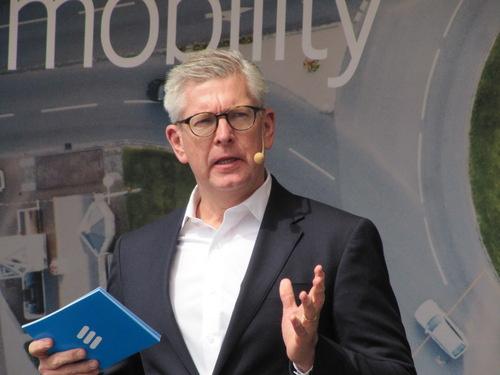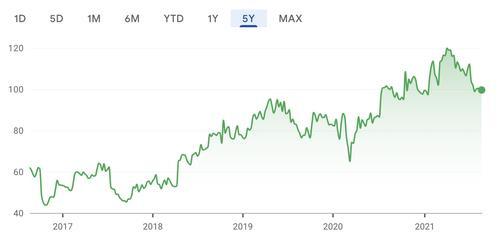Börje Ekholm prefers not to pick any sides when talking geopolitics, but the boss of Ericsson is admittedly concerned the West will lose out if the global mobile standard is eventually torn apart. Inside the telecom industry, fear has grown that a bust-up between the US and China will cleave through standardization, leaving the telecom sector with Chinese and non-Chinese 6G or even late-stage 5G technologies.
"If the tech world is fragmented East and West then it is going to mean competition between two ecosystems," Ekholm tells Light Reading in an exclusive interview. "A Chinese ecosystem will be formidable competition for the West. It concerns me that end users – customers and enterprises – will feel it in their mobile experience."

Ericsson CEO Börje Ekholm is worried about the impact of fragmentation.
It would not be the first time there were multiple communications standards for different parts of the world. In the early day of 3G, Europe and the Americas had incompatible systems. China, meanwhile, was busy trying to cultivate a homegrown 3G standard. Its ill-fated TD-SCDMA technology could not dislodge the more widely used W-CDMA, despite adoption by China Mobile, the world's biggest operator by customers. Today, it is generally regarded as a technological failure.
But a future split would probably not have the same outcome. While TD-SCDMA might have bombed, its good bits were carried into the 4G technologies that propelled China's Huawei to the top spot in market-share rankings. Decried as an unsophisticated copycat at the turn of the millennium, China is today seen as a technology frontrunner, home to some of the most advanced developers on the planet. With its huge population and vast resources, it could be irrepressible as a separate telecom ecosystem shut off to the West, Ekholm fears.
"Despite strong 5G investment in the US, it's less clear whether a Western ecosystem will keep up with the vast R&D spend in Asia – particularly China – that's already happening," he says.
The China syndrome
Worsening relations between the US and China have already had consequences for his business. Under American pressure to outlaw Huawei, Sweden's government followed the UK's last year in banishing Chinese vendors from its 5G market. In what Ekholm sees as retaliation, the state-backed China Mobile awarded Ericsson a paltry 2% share of its latest 5G contracts, down from 11% last year. And a Reuters report suggests that China Telecom and China Unicom have made similar cuts on their joint network project, leaving Ericsson with only 3% of the phase-two work.
Unable to confirm those reports at the time of his Light Reading interview in early August, Ekholm said the figure was "not unlikely." With Finnish rival Nokia capturing only a small share of the contracts awarded by China Mobile, the tender leaves Chinese operators almost entirely dependent on domestic suppliers just as Huawei has lost its footing in parts of Europe. It is these tectonic shifts in the vendor landscape that are responsible for the anxiety about standards.
Despite his usual wariness about geopolitical confrontations, Ekholm was quick to criticize the Swedish government's decision to exclude Huawei, arguing it was not in the spirit of free trade and warning about the repercussions for Ericsson and Sweden. His critics would say Western governments cannot simply ignore the security threat posed by China, or turn a blind eye to China's alleged theft of intellectual property, disregard for trade norms and refusal to allow European and American firms anything but a minor role in the Chinese market.
Yet Ekholm sees major inconsistencies in the Swedish and European Union positions. The campaigns against Huawei and ZTE, a smaller Chinese vendor, overlook just how entangled Chinese and Western interests have become in the age of globalization, he points out. "China and the West have mutual dependencies – for example in the automotive sector," he says. "That is a question you have to think about." Headquartered in Gothenburg, the Swedish carmaker Volvo was bought by China's Geely in 2010.
Similarly, Ekholm thinks it strange that European Union members have not had any consistent or coordinated response on the matter of Huawei. Despite the Swedish government approach, Dutch incumbent KPN said it would switch to Huawei from Ericsson, its 4G supplier, when building a 5G network.
Fragmentation fear
Any vendor that has enjoyed success with a global standard is bound to worry about the mere possibility of fragmentation. The ability to develop the same kit for any part of the world has brought lower costs and spurred take-up of telecom products. But would the emergence of two separate ecosystems be all bad for Ericsson? It has never had unfettered access to China anyway, and it would face less Chinese competition in certain other parts of the world.
"I am less worried about Ericsson in that scenario," says Ekholm. "Ericsson can survive. Ericsson can work there. But will the technology ecosystem in the West be large enough or are we going to suffer on technology developments and productivity developments? That is the big question."
Want to know more about 5G? Check out our dedicated 5G content channel here on Light Reading.
China hardly looks unstoppable today. For all its technology prowess, American designs or tools underpin many of the components used by Chinese equipment makers. Carefully crafted US sanctions mean Huawei can no longer buy those products, and it is short of alternatives. At some point, analysts think it will run out of stock and need to fall back on lower-quality chips.
Whatever befalls Huawei, China is determined to acquire the design expertise it lacks and be self-sufficient in future. And Ekholm is not the only observer who thinks it could ultimately prove formidable. In a paper published last year, analysts at New Street Research wrote that China's vast resources of human capital give it a decisive long-term advantage. Semiconductor expert Earl Lum of EJL Wireless Research holds similar views. "There are so many people in China to hire," he previously told Light Reading. "It doesn't matter that everyone you are hiring isn't an Einstein. One of them will be."
If Western innovation does fall behind, the future risk could be a kind of digital divide between Chinese and non-Chinese spheres of influence. Western companies might also struggle to compete in contested markets, including some African nations. There have already been signs of a new telecom scramble for Africa. In May, a consortium called GPE secured an Ethiopian telecom license thanks to US financing. Funds were provided on the condition GPE does not use Chinese network kit.
Ekholm not giving up on China
Ekholm would prefer to see the West take on China through greater investment in education. "China, among other growing economies, has made enormous strides in education and graduates significantly larger numbers of engineers each year to keep pace with the demand for specialists."
"Europe and North America have proud academic histories in sciences and engineering and future prosperity depends in large part on continuing to ensure that investment in education meets the needs of the economy," he continues. "That's critical for companies like ours. We are only as good as our ability to innovate."
For all his words of caution about the demise of the global standard, Ekholm agrees the industry has become too reliant on China or Asian manufacturers in China's backyard. But he does not sound at all convinced by European Union plans to double Europe's share of global semiconductor production to 20% in the next decade. A more sensible strategy, he suggests, could be an alliance with the US, already home to manufacturers like Intel with big spending plans of their own.
Share price recovery: Ericsson under Ekholm (Swedish kronor)

Source: Google Finance
Ericsson's setback in China must rank as one of the biggest disappointments of Ekholm's four-and-a-half-year stint as CEO. On July 16, Ericsson revealed that Chinese sales have already dropped this year, falling 60% year-on-year for the recent second quarter, or about $390 million. Its share price fell 10% in Stockholm that day. Yet it remains almost double what it was at the start of 2017, when Ekholm took charge, and Ericsson's profitability has soared during his tenure.
Whatever happens in geopolitics that he cannot directly control, Ekholm remains determined to reverse his company's fortunes in the world's biggest 5G market. "I think if there is one thing that characterizes Ericsson it is resilience," he says. "We are not going to give up. We are going to fight as hard as hell to get back." In the meantime, investors can take comfort in knowing that Ericsson is still thriving in just about every other part of the world.
